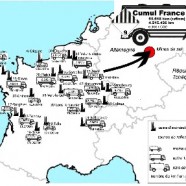Nuclear waste
The return of nuclear waste in Germany is legitimate. This waste is an inevitable byproduct of reprocessing spent fuel from German nuclear reactors. The return of waste conforms to contracts signed by the German and French nuclear industries as well as their respective governments.
Each country that took the decision to invest in the nuclear industry and prefers reprocessing is responsible for the waste. European countries use the reprocessing plant in La Hague Peninsula as a means to differ national management of nuclear waste. Until further notice, Germany decided to abandon nuclear power. This does not lessen the country’s responsibility of all nuclear waste that was produced in Germany by itself or its foreign subcontractors. Leaving nuclear power imposes both reflection and a call to action on waste management of production and dismantling materials.
Oil slick Queen demolished in Bangladesh ?
According to informations coming from Chittagong, three container ships managed by German companies have just been put on sale on the demolition market. These three vessels are the joint property of KGAL, based in Germany, the largest European maritime leasing* company, and subsidiary of Allianz and Dresdner Bank, and of V Ships Germany, subsidiary of V Ships Monaco, the largest manager of commerce vessels in the world.
The Ankara, the Maersk Brisbane, and the Maersk Barcelona (Maersk is solely the charterer) were built in Germany in 1975-1976 and are motorized by vapor turbines whose installation requires large quantities of asbestos. These three sisterships have a lightweight of 15,000 t each.
Already, V Ships and KGAL have made it known that they will assign the container ships destined for demolition to the highest bidder, that is to say to Bangladeshi demolition shipyards, at around $700 per ton while the average price in India is around $550 per ton.
Considering social, sanitary, and disastrous environmental conditions in Bangladesh, Robin des Bois asks these European companies to either proceed with the preliminary removal of asbestos, to choose the best Asian demolition shipyards within the framework of a specific partnership, or even to demolish and recycle these vessels in Europe. A letter was sent to them in this respect.
The three container ships are frequently in European waters and one of them, the Maersk Barcelona, appeared on the Atlantic front in September 2005, near the island of Sein, off Brittany, by a record “61 km (38 miles) oil slick” that was sanctioned by an $800,000 fine. The inspectors from the vessel security center had revealed a lack of care for the oily waters treatment installation.
Oil slick Queen demolished in Bangladesh ?
According to informations coming from Chittagong, three container ships managed by German companies have just been put on sale on the demolition market. These three vessels are the joint property of KGAL, based in Germany, the largest European maritime leasing* company, and subsidiary of Allianz and Dresdner Bank, and of V Ships Germany, subsidiary of V Ships Monaco, the largest manager of commerce vessels in the world.
The Ankara, the Maersk Brisbane, and the Maersk Barcelona (Maersk is solely the charterer) were built in Germany in 1975-1976 and are motorized by vapor turbines whose installation requires large quantities of asbestos. These three sisterships have a lightweight of 15,000 t each.
Already, V Ships and KGAL have made it known that they will assign the container ships destined for demolition to the highest bidder, that is to say to Bangladeshi demolition shipyards, at around $700 per ton while the average price in India is around $550 per ton.
Considering social, sanitary, and disastrous environmental conditions in Bangladesh, Robin des Bois asks these European companies to either proceed with the preliminary removal of asbestos, to choose the best Asian demolition shipyards within the framework of a specific partnership, or even to demolish and recycle these vessels in Europe. A letter was sent to them in this respect.
The three container ships are frequently in European waters and one of them, the Maersk Barcelona, appeared on the Atlantic front in September 2005, near the island of Sein, off Brittany, by a record “61 km (38 miles) oil slick” that was sanctioned by an $800,000 fine. The inspectors from the vessel security center had revealed a lack of care for the oily waters treatment installation.









